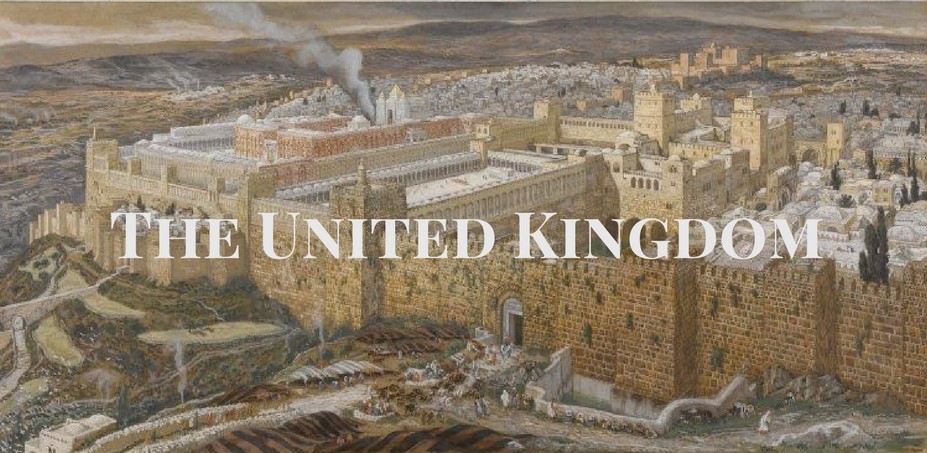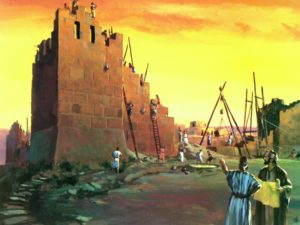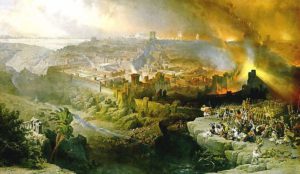Lesson 7 gave an overview of the Anarchy Period, ultimately creating a high expectation of imminent kingship within Israel. Israel as a nation is ripe for order and leadership. Perhaps the promised king from the line of Judah (Gen. 49:10) is about to burst on the scene! Lesson 8 responds to this expectation by introducing the United Kingdom Period of Israel’s history.
Introducing the United Kingdom Period
This period of biblical history (1 Samuel 8 – 1 Kings 11; 1 Chronicles 1 – 2 Chronicles 9) fills 97 chapters of the Old Testament. The fact that the Holy Spirit would spend so much time on this period of history emphasizes its importance. First Samuel 8 begins the period with Israel asking for a king, and 2 Chronicles 9 ends the period with Israel’s most glorious king dying. The question then becomes- what about this history is so important, and how does it perpetuate the gospel announced in Genesis?
What makes the United Kingdom Period important?
This biblical period narrates the explosion of God’s special kingdom onto the scene of history in a way not previously experienced. This is especially noticeable when zooming in on the book of Samuel. God is in control and ruling the universe from the minute He creates light with His breath to the second He kills Eli and his two sons in 1 Samuel 4. Through the first eight books of the Bible it is easy to see that God is King of the world and especially Israel. However, up to 1 Samuel 8, God never rules Israel through a human king, though an earthly king seems to have always been within the mind of God (Genesis 1:26-28, Gen. 17:6, 16, Gen. 35:11, Gen. 49:8-12, Num. 24:7). Israel had to be prepared for this inaugural moment. From Abraham to Moses to Joshua to Samuel, Israel is being taught that God is King. Did they learn this lesson? The booming voice of God declares in 1 Samuel 8:7 that they have not learned the lesson in fact. They, “Have rejected Me (God), that I should not reign over them.” When God gives them Saul as king, it is another attempt to teach them the lesson above (see 1 Samuel 8:11-18). Saul will go on to oppress the people and leave the nation in shambles just as God said through Samuel. This paves the way for a king after God’s own heart (David), clothed with the wisdom and glory of God (Solomon). During the United Kingdom of David and Solomon, Israel will finally see in a shadowy form what God ruling over the universe looks like. This is more clearly realized when reading Psalm 2, understanding that this psalm was read at the inauguration of each Israelite king, and describes the king as the son of God (2:7), ruling the earth (2:8), and the one in whom Israel was to put their trust (2:12). No two kings embody this glorious rule of God like the combined reign of David and Solomon.
How does this history perpetuate the gospel announced in Genesis?
Abram was promised four things: 1) Great Nation 2) Great Land 3) Great Name 4) Great Blessing. During the United Kingdom of Israel, these promises to Abram reach a climax.
![[Tags] abrahamstars-300x175 Lesson 8- What You Need to Know About the United Kingdom Period](https://fiveminutebiblestudy.com/wp-content/uploads/2018/03/abrahamstars-300x175.jpg) 1. Abram’s seed has become a great nation (1 Kings 10:23-25/Gen. 12:2) like the ‘dust of the earth’ (2 Chron. 1:9), the ‘sand on the seashore’ (1 Kings 4:20), and the ‘stars in the sky’ (e.g., 1 Chron. 27:23), the standards of comparison for the multitude of Abraham’s promised descendants (Gen. 13:16; 15:5; 22:17).
1. Abram’s seed has become a great nation (1 Kings 10:23-25/Gen. 12:2) like the ‘dust of the earth’ (2 Chron. 1:9), the ‘sand on the seashore’ (1 Kings 4:20), and the ‘stars in the sky’ (e.g., 1 Chron. 27:23), the standards of comparison for the multitude of Abraham’s promised descendants (Gen. 13:16; 15:5; 22:17).
2. David’s military victories expand the land that Solomon inherited from the River of Egypt to the Euphrates (1 Kings 4:21), which reflects God’s covenant with Abraham (Gen. 15:18). This is exactly how far God promised to extend the land.
3. Israel gains a great name among the nations, capturing the attention of everyone during Solomon’s reign, even the great Queen of Sheba (1 Kings 10:1-9/Gen. 12:2).
4. Israel becomes a great blessing to all the nations of the earth by declaring the glory of God. When the nations look at Israel, they, “Know that the Lord is God; there is no other,” (1 Kings 8:60).
It would seem that with the Davidic-Solomonic kingdom, the prophecy of Genesis 49:10 also finds fulfillment- a ruler from Judah has come. “But…” this is how 1 Kings 11 starts, and this is why the United Kingdom of Israel, even with all its glory, fails to fulfill Genesis 49:10. David and Solomon both have their faults, great faults. They are Samson all over again with their overt interest in the opposite sex. Thus, God the King raises up an adversary (lit.- “a satan”) against Solomon all the latter years of his life (1 Kings 11:25). This seems to be just the opposite of what God prophesied would come in Gen. 3:15. In light of that ringing prophecy (Gen. 3:15), the play on words in 1 Kings 11:25 is a reminder that Solomon is not the conclusion to the story. He might be a shadow of the Messiah, but we still wait for another. We wait for a shepherd-king with the powerful right arm of David, the wisdom, peace, and glory of Solomon, and the moral uprightness that neither one could harness.
Conclusion– Lesson 8 takes us to the top of the mountain in Israel’s history, only to find out there is another valley. Five Minute Bible Study is only glazing the surface of each biblical period. Open your Bible, build on these bullet points, and gear up for Lesson 9 next week as we discover- What You Need to Know About the Divided Kingdom Period.
Helpful Resources– 1) An Old Testament Theology by Bruce Waltke 2) An Introduction to Biblical Studies by James Smith



